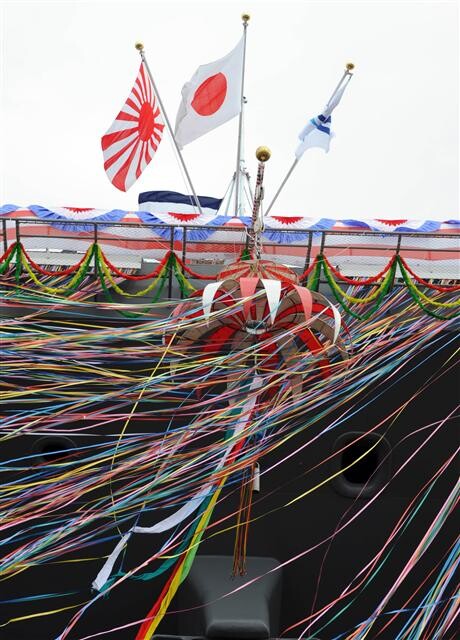hankyoreh
Links to other country sites 다른 나라 사이트 링크
Japanese government officially condoning use of Rising Sun Flag

By Jeong Nam-ku, Tokyo correspondent
Amid growing controversy about Japanese fans who flew the Rising Sun Flag during the 2013 EAFF East Asian Cup football game between Japan and South Korea, which was held on July 28 at the Sports Complex in Seoul, the Japanese government is pushing forward measures to make it official government policy that there is no problem with using this flag, the Sankei Shimbun reported on Aug. 6.
“Along with the official flag of Japan, the Rising Sun Flag is a flag that symbolizes Japan. The Japan Self-Defense Forces have used it for a long time, and it is also accepted on an international level,” the conservative Senkai Shimbun claimed. “By expressing their opinion on the matter, the Japanese government intends to check the rising tide of anti-Japanese sentiment in Korea,” the paper added.
Many in the international community see the Rising Sun Flag as a provocative symbol of Japan’s World War II-era militarism.
The article went so far as to say that Japan “must prevent the honor of the Rising Sun Flag from being besmirched by anti-Japanese nationalism in South Korea, which has reached excessive levels.”
It is expected that the Japanese government will emphasize the fact that the Rising Sun Flag has long been used as a symbol for Japan along with the official national flag, and that even today it is used without any problem in the Japanese private sector.
When the controversy over Japanese fans flying the Rising Sun Flag broke out, an official in the Japanese government told reporters that “the Rising Sun Flag symbolizes the sun rising in the morning. It was used as such by the army, but it is unrelated to militarism.”
The government official also mentioned that the Rising Sun Flag is the flag of the Asahi Shimbun.
The pattern that appears on the Rising Sun Flag was long used in Japan as a symbol emphasizing auspicious occasions. But in 1870, the 16-ray flag was officially selected for the first time as the flag of the Japanese ground forces.
Japan stopped using the Rising Sun Flag as a military standard after it was defeated in the Second World War, but when the Japanese Self-Defense Forces were established in 1954, an 8-ray Rising Sun Flag was chosen as its flag.
The flag is also used in the private sector in Japan. The official group of supporters for the Junichi Dragons, a pro baseball team, uses a flag with the Rising Sun design on a blue background. There is also a cheering squad for the Japanese national football team that uses a blue Rising Sun design. In Japan, the Rising Sun design is not regarded solely as a symbol of militarism.
But the problem is the actual context in which the Rising Sun Flag is used. The flag is a favorite of ultra-right groups such as the Meeting of Citizens Against Privileges for Korean-Japanese, who aggressively use it in their anti-Korean demonstrations.
Japanese media website News Post Seven ran an interview with Japanese supporters who held the Rising Sun Flag at the Korea-Japan football game on July 28. “During the Korea-Japan football game in 2010, supporters of the Korean team carried a big banner with the face of [Korean independence activist] An Jung-geun on it,” the supporters said. “The psychology of football supporters is that you have to give as good as you get. We were thinking that we had to pay back the Koreans at some point.”
In other words, the supporters were not just raising the Rising Sun Flag because they wanted to carry the flag of Japan.
It is in this context that the organizing committee banned the Rising Sun Flag from being brought into the football stadium during the under 20 women’s football World Cup, which was held in Japan in Aug. 2012.
Please direct questions or comments to [english@hani.co.kr]

Editorial・opinion
![[Editorial] Does Yoon think the Korean public is wrong? [Editorial] Does Yoon think the Korean public is wrong?](https://flexible.img.hani.co.kr/flexible/normal/500/300/imgdb/original/2024/0417/8517133419684774.jpg) [Editorial] Does Yoon think the Korean public is wrong?
[Editorial] Does Yoon think the Korean public is wrong?![[Editorial] As it bolsters its alliance with US, Japan must be accountable for past [Editorial] As it bolsters its alliance with US, Japan must be accountable for past](https://flexible.img.hani.co.kr/flexible/normal/500/300/imgdb/original/2024/0417/6817133413968321.jpg) [Editorial] As it bolsters its alliance with US, Japan must be accountable for past
[Editorial] As it bolsters its alliance with US, Japan must be accountable for past- [Guest essay] Amending the Constitution is Yoon’s key to leaving office in public’s good graces
- [Editorial] 10 years on, lessons of Sewol tragedy must never be forgotten
- [Column] A death blow to Korea’s prosecutor politics
- [Correspondent’s column] The US and the end of Japanese pacifism
- [Guest essay] How Korea turned its trainee doctors into monsters
- [Guest essay] As someone who helped forge Seoul-Moscow ties, their status today troubles me
- [Editorial] Koreans sent a loud and clear message to Yoon
- [Column] In Korea’s midterm elections, it’s time for accountability
Most viewed articles
- 1[Column] The clock is ticking for Korea’s first lady
- 2Samsung barricades office as unionized workers strike for better conditions
- 3[Editorial] When the choice is kids or career, Korea will never overcome birth rate woes
- 4[News analysis] After elections, prosecutorial reform will likely make legislative agenda
- 5S. Korea, Japan reaffirm commitment to strengthening trilateral ties with US
- 6Japan officially says compensation of Korean forced laborers isn’t its responsibility
- 7Why Israel isn’t hitting Iran with immediate retaliation
- 8[Editorial] Does Yoon think the Korean public is wrong?
- 9[Guest essay] How Korea turned its trainee doctors into monsters
- 10[Editorial] As it bolsters its alliance with US, Japan must be accountable for past